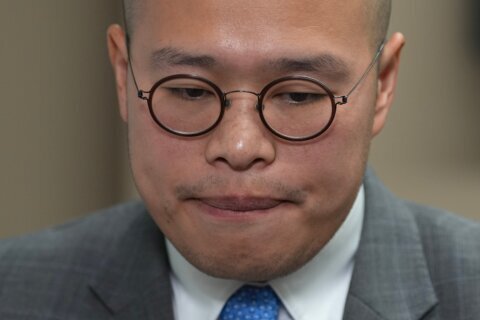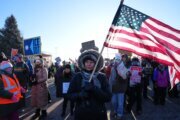MORRISTOWN, New York (AP) — A year ago this Sunday, I was making berry pies in the kitchen when I glanced outside: Dad had taken another face-plant in the grass.
Time to get a plastic chair, twist his limbs to a kneeling position and use his still-strong arms to get upright.
At 84, the former athlete-turned-dentist and father of four had been struggling with Parkinson’s, the dementia that it often brings and the general indignities of old age. So the few choices he had left he cherished deeply, including being able to roam or nap or eat sweets whenever he wanted.
And roaming often involved, as care workers would say with a gasp, “A fall!”
Falls are the No. 1 cause of injury and deaths from injury for elderly people in the U.S, according to the Centers for Disease Control and Prevention. Older Americans fell 29 million times in 2014, causing 7 million injuries and costing an estimated $31 billion in annual Medicare costs, the agency says, citing the latest statistics. Falls evict people from their homes, shorten their lives and destroy their quality of life.

But not to fall means not to roam, which was a no-go for us.
So when nursing home officials or physical therapists asked “Has he fallen at any time in the last six months?” we were savvy enough to sidestep possible elder abuse lawsuits.
“Why yes, he has,” was a fine reply. “About three times a day” was not.
Sometimes Dad was so black-and-blue from his falls that he looked like a boxer’s punching bag. He had contusions on his head, his arms, his legs. Despite being wrapped like a mummy in Band-Aids, he bled across the house like a hemophiliac.
But after drinking milk every day of his life, Dad never did dent a single bone, while mom, his 80-year-old caretaker, cracked a toe, a finger or a rib every other month.
___
This is the first Father’s Day since he passed away, so of course it’s a kick in the gut.
Dad, however, would not have cared one whit. He was old school, honor thy father every day of the year, don’t get sucked into this commercial hoopla — unless, perhaps, it’s a gift of sturdy overalls that will be worn for years in the garden.
Richard Joseph Norman, born May 18, 1932, in the hard-luck upstate New York town of Ogdensburg, was an only child and a scholarship boy. So for the rest of his life, he concentrated on two things: family and charity. And he created those families wherever he went.
Drafted into the army as a dentist, Dad was Alan Alda 15 years before “M(asterisk)A(asterisk)S(asterisk)H” went on the air, a maverick who brought wit and kindness to an institution not known for either quality. His bosses did never understand why so many enlisted men with girlfriends in distant cities had frequent dental problems on Friday afternoons.
Charity to Dad was not writing a check or attending a banquet. Every Thursday on his day off, Dad would drive around Rochester to round up supplies for the local homeless shelter — sacks of potatoes, onions and carrots, industrial-sized cans of beans or tomato sauce. On Monday nights in the fall, he would hold a free dental clinic for migrant workers.
At his office, those who came to work for him stayed for life. And Dad knew everything about his patients, not just how their cracked molars were doing, for long before Rochester folk embraced psychologists, everyone talked to their dentist.
___
In hindsight, we had plenty of signals of the end. Dad — whose license and keys had long been taken away — snuck out and crashed a car while mom was taking a nap. He blithely walked into a frigid river in his underwear for a swim. Plagued by insomnia, he ventured out in the snow to visit neighbors’ porches or parked cars at 4 a.m. — thank God no one shot him.
Once as I was trying to get Dad back into bed at 3 a.m., he became stressed and stepped back with his right foot. I felt sick, knowing that was just what a former black belt would do before delivering a kick that could shatter my tibia. I let him eat the cookies.
Still, Dad became lucid as a fox the day we had to put him in a nursing home.
“I did not sign up for this, Sheila,” he said, eyeing the meager twin bed and the room’s barren industrial patina. The snores of his new roommate reverberated through a flimsy curtain.
Dad lasted just over a month in that restricted setting.
The first few days he walked around its circular hallway compulsively, carrying his walker like a knapsack, seeking the one unlocked door that would lead to freedom. Within a few days, the facility’s rigid fears about falls meant he was effectively locked into a wheelchair. Soon afterward, he struggled to swallow and gave up on eating.
___
So this year my berry pies have no ardent admirer and Dad’s 12 grandchildren have no one to tease them. Two family weddings have brought us together but we still crumble at the sound of “Taps,” remembering the yellow birch leaves that fluttered down on his grave.
Dad’s lessons on family and charity will live on, however. So on this Father’s Day, I want to celebrate a full life well-lived, a spirit that roamed and gave laughter and kindness to friends and strangers alike. There is no better legacy.
Copyright © 2026 The Associated Press. All rights reserved. This material may not be published, broadcast, written or redistributed.





